Jaws of Death Read online
Page 7
Max climbed into the back seat and slouched down in the corner, still thinking about his father.
It was dark now. A bat flitted by overhead, just visible in the light from the windows of the house. Alicia Ashworth-Ames was silhouetted in the doorway. She raised a hand briefly to wave them goodbye, then turned away and closed the door.
They headed back through the village and down a narrow, winding country lane that had dense woodland on both sides, branches overhanging the road so that it felt as if they were driving through a tunnel. The headlamps picked out the trunks of beech and oak trees, their leaves shimmering in the bright light. A shape darted across the road in the distance, out beyond the reach of the headlamps – a fallow deer moving from one part of the forest to another.
Max felt as if he were in a cocoon, protected from the outside world. There was something unsettling, threatening even, about the woods, about their dark, hidden reaches, the wild animals creeping through the undergrowth. But Max was cut off from all that, safe inside the metal shell of the car. The low, monotonous hum of the engine was comforting. So too were Consuela and Chris in the front.
He closed his eyes and rested his head on the seat back, feeling the swaying motion as the car turned through the bends, left then right, then left again. It was soporific. Max felt himself getting drowsy.
Then he suddenly became aware of another sound – a louder, more intrusive engine noise. He opened his eyes. The interior of the car was lit up by the headlights of a vehicle behind. Max twisted round in his seat and looked out of the rear window. The vehicle was recklessly close, only a couple of metres back. Its headlights were high and dazzling. Behind the beams Max made out the shape of a big black four-wheel-drive Range Rover.
‘Jeez, what’s that guy doing?’ Chris said, averting his eyes from the glare of the headlights in his rear-view mirror. He slowed a little. ‘Go on, mate, go past if you want to.’
The Range Rover pulled out to overtake. Max watched it come alongside them. It had tinted windows so he couldn’t see who was inside. He waited for it to zoom ahead, but it held its position next to them as if it didn’t have the speed to get past.
‘What the hell is he playing at?’ Chris shouted.
The road was descending a steep hill now, twisting and turning through the woods. Chris braked. Max expected the Range Rover to surge away from them, but it stayed level. The driver was braking too.
Max felt a jolt of alarm. Something wasn’t right. Chris knew it as well. He swore under his breath and braked again. The driver of the Range Rover must have been anticipating it for he also slowed. The two vehicles sped down the hill only half a metre apart. Max looked across the gap. The Range Rover was much bigger and heavier than Consuela’s Nissan. It seemed to tower over them, dark and menacing.
Then, suddenly, the Range Rover veered towards them. Max could hear the harsh roar of its engine. Its front wing smashed into the side of the Nissan. The Nissan swerved. Consuela screamed. Max hung on tight to the door handle next to him, his heart hammering.
Chris jammed on the brakes, but the other driver did the same. The two vehicles collided again. There was an ear-piercing screech of metal scraping against metal. This time, the Range Rover didn’t pull away. It kept on coming, forcing the Nissan closer and closer to the edge of the road.
Chris turned the steering wheel, trying to hold his line, but the Range Rover was too powerful. It was like a tank, massive and unstoppable.
The road started to bend sharply to the right. The Range Rover stayed in the middle of the carriageway. The two vehicles were still touching. Chris struggled desperately to force the other car away, but it was no use. The Range Rover increased the pressure, pushing the Nissan sideways. The screech of metal intensified. It was like a circular saw cutting through steel plate. Max could see the side of the other vehicle through his window, could see the door beside him starting to buckle with the pressure.
‘Hang on!’ Chris yelled.
He stamped hard on the brakes. The Nissan’s wheels locked and it skidded, the tyres burning. Max lurched forward, but the seatbelt held him. The Range Rover shot past, tilting over almost onto two wheels as it careered round the right-hand bend. Chris wrenched the wheel over, fighting to control the Nissan, which was sliding rapidly to the left. For a second Max thought they were going to make it, then the nearside wheels hit the grassy verge and lost their grip. The car skidded over the edge and slithered twenty metres into the woods, narrowly missing a beech tree before coming to a halt in a clump of bushes.
Max sagged back in his seat and panted for breath. He felt sick. His pulse was throbbing violently.
‘You OK, Max?’ Chris called out.
‘Yes.’
‘Consuela?’
‘I think so.’
Max pushed at his door. The metal was so crushed it wouldn’t open. He slid across to the other side and got out.
There was no sign of the Range Rover. It had vanished into the night. The Nissan’s headlights were still on. Max walked around the car and looked at the damage. The front wing and offside doors were twisted and bent, the bare metal showing through the scraped paintwork.
They’d been lucky. The edge of the road where they’d come off was soft earth which had helped slow the car down, and the forest here was less dense, the trees more widely spaced than up the hill. If they’d smashed into an oak, they would certainly have been badly injured, maybe even killed. Chris’s driving, his quick reactions, had also helped save them. Max dreaded to think what might have happened with a less skilful driver at the wheel.
He leaned back on the car, trembling from head to toe, wondering if he was going to throw up. He took a few deep breaths, trying to shake off the nausea, and thought about what had just occurred, visualizing the Range Rover smashing into them, forcing them off the road. It could only have lasted a few seconds, but it seemed an eternity as it was happening. He hadn’t noticed the Range Rover’s number plate. He hadn’t seen the driver. But whoever it was, Max was certain of one thing: he had been trying to kill them.
SEVEN
It was gone midnight by the time they got home. Extricating the car from the woods had proved more difficult than they’d expected. Chris had tried reversing it back out onto the road, but the ground was too soft. The wheels had simply spun round and round, digging the Nissan even deeper into the earth. It had been no better with Consuela in the driver’s seat, Chris and Max pushing with all their combined strength. The car was stuck fast.
They called Consuela’s breakdown service and had to wait an hour and a half for a van to come out to them. The mechanic – a large, cheerful man with a red, weather-beaten complexion – hitched the Nissan to a tow rope and pulled it out in ten minutes. He inspected the bodywork, curious about the damaged doors and paintwork. Chris told him the truth – said they’d been hit by another car and left it at that. The mechanic asked if they wanted to report the collision to the police. He seemed surprised when they said no, but didn’t press them further. He checked the Nissan over to make sure it was fit to drive and sent them on their way.
Chris drove. Consuela was still too shaken by the crash to feel up to dealing with the roads and the other traffic. At the back of all their minds was the fear that something else might happen, that the Range Rover might be waiting for them up ahead, but in the end it was an uneventful journey back to London.
Half a mile from their house, Consuela took the wheel again while Chris lay down out of sight on the floor. Max kept a sharp eye out for the Toyota Avensis as they came down their street – and there it was, parked in its usual place, two men in the front.
Consuela reversed into the drive and Chris sneaked unseen into the garage and from there into the house. Max and Consuela went in through the front door. Consuela locked and bolted it behind them. Chris was already in the hall. He ran softly upstairs to check all the rooms, then came back down and gave them the thumbs-up: everything seemed normal, no intruders lurking in dark corners.
They were all nervous. Although they were back in their home again, they felt vulnerable. Was the house safe? Could someone break in and attack them? They’d already decided that Chris would spend the night on the upstairs landing rather than in the basement. Max and Consuela would sleep a lot more soundly knowing that he was just outside their bedroom doors.
But Max couldn’t sleep. The crash was too fresh, too vivid in his memory. Someone had tried to kill them. Was that really what had happened? It had certainly felt like it at the time, but maybe the intention had simply been to frighten them, to warn them off – a more obvious, more violent reminder of Rupert Penhall’s warning not to meddle in things that didn’t concern them.
And Max was frightened. The collision had terrified him. Where had the Range Rover come from? How did the driver know that Max and Chris and Consuela would be on the road near Henley at that particular time? Max was sure they hadn’t been followed from London. He’d been careful when he first rang the Ashworth-Ames’ house, ensured that he was using an untraceable mobile phone. That left only two other possible explanations: the Ashworth-Ames’ phone line was being monitored so Max’s call would have been recorded at their end, or their house was being watched – or both. A surveillance team in London, another one out in Oxfordshire – that was a serious operation requiring a lot of manpower. But who was behind it? Julius Clark? Rupert Penhall? Penhall claimed to be linked to the government. Would the British government really have authorized an attempt to kill Max and his companions?
He gradually dozed off into a troubled sleep that was filled with nightmares about the collision and Redmond Ashworth-Ames. Conscious or unconscious, the same thoughts, the same sights tormented him, and he was glad when morning came and he could get up.
Chris was in a sleeping bag on the landing. He appeared to be asleep, but as Max stepped around him, he opened his eyes and gave Max an enquiring look – as if to ask, Are you OK?
Max nodded and went downstairs. Chris joined him in the kitchen a couple of minutes later and they had breakfast together in silence. It was Saturday. Max had a show at the London Cabaret Club that evening – his last of the current run. He and Consuela would need to go over there in the afternoon to prepare for the performance, but the morning was free. Max had an idea how he was going to fill the time. It had come to him during the night, when he’d been lying awake thinking about Henley and a phrase had come into his head that wouldn’t go away: Know your enemy.
The phrase presumably had its origins in warfare, but Max had heard it applied to other things – to sporting contests, for example. It was a good maxim to apply to almost anything in life. Prepare yourself for your opponents, find out as much about them as you possibly can, and then you stand a better chance of beating them.
Know your enemy.
Know Rupert Penhall.
Know Julius Clark.
Max took Consuela and Chris into the basement and told them that he wanted to visit the local library and go online to search for information. He couldn’t do it from home because their computer was almost certainly compromised, their emails and Internet activity being monitored by the surveillance team. But the library had terminals that would be safe to use.
Chris came with him. After the previous evening, he wasn’t going to let Max go anywhere unaccompanied. They went over the wall at the bottom of the garden and took a long, circuitous route to the library just in case anyone was following them. Max sat down at a free terminal and clicked onto the Internet. Chris stood close by, where he could watch both Max and the library doors. Max typed in Rupert Penhall’s name first and wasn’t surprised to find nothing about him. Whoever Penhall was, he would make absolutely sure the details of his life were kept secret.
Max tried Julius Clark next and got nearly four million results – far too many to even begin searching through them. He added ‘businessman’ after Clark’s name and narrowed the search down to 98,000. That was still too many to handle so he made it ‘billionaire businessman’. He was down to fewer than 5,000 results now. He scrolled down through the entries. The search engine had focused on the word ‘billionaire’ as much as on Clark’s name, and most of the entries concerned very rich people other than Julius Clark.
Max kept going through the pages. For a man as wealthy and apparently influential as Clark, there seemed to be very little about him on the Net. He clearly kept a very low profile.
Then something came up: The Shadowy World of Reclusive Tycoon Julius Clark. That had to be him. Max clicked on the entry and a newspaper article from the London News Chronicle appeared on the screen. It was a feature from the paper’s financial section, written two months earlier by a journalist named Dan Kingston. Alongside the article was a grainy photograph of a man in a dark suit with rimless spectacles, which looked as if it had been taken with a long lens on a very dull day. It was a poor image, but Max had no trouble recognizing the man he’d met on Shadow Island. He gave a shudder. Clark’s face didn’t bring back pleasant memories.
Max read through the article. It was a thin piece, low on real, substantiated facts. The journalist had obviously struggled to find solid information about Clark and had resorted to speculation and rumour instead. But despite its shortcomings, the feature managed to give an effective impression of the billionaire businessman. ‘A recluse’, ‘publicity-shy’, ‘secretive’ were some of the ways in which he was described. ‘Fabulously wealthy’, ‘well-connected’ and ‘utterly ruthless’ were others.
Clark’s background was vague. No one seemed to know where he’d been born or where he’d spent his youth. Even his age was unclear. ‘Somewhere in his fifties’ was about as close as anyone could get. His nationality too was uncertain. He might have been American, or possibly Canadian. There were rumours that he was really Swiss, and more than one source claimed he was Russian. The truth was he had no nationality, no ties to one particular country. Like many billionaires, he was effectively stateless. He lived out his life on a global stage, travelling ceaselessly from one country to another, never staying anywhere for long. He had houses in London, New York, Zurich and Moscow, and a luxury beachfront estate in the Bahamas where, it was said, he entertained politicians and business leaders from around the world.
No one was very sure what his political affiliations were because his whole life was shrouded in secrecy. His business interests were equally shadowy. Max had trouble understanding this part of the article. He didn’t really know what ‘shell corporations’ or ‘offshore holding companies’ were, but he got the general idea that Clark had fiendishly clever ways of hiding his moneymaking activities. The only facts that everyone seemed to agree on were that Clark was a very private man, had a network of powerful political and business friends and was extremely rich – his personal wealth was estimated at somewhere between ten and twenty billion US dollars, depending on which source you believed.
Max printed off a copy of the article, tucked it safely away in his pocket, then he and Chris left the library.
His show in the evening went well. Max felt safe in the theatre and it was a relief to have something to take his mind off his worries; something over which he had absolute control. If only life were as simple as a stage show.
The next morning he went to visit his mother in prison. Consuela drove them out through the sprawling suburbs of London and on into Suffolk. The Avensis followed them all the way, but Max didn’t let it unsettle him. He was sure they wouldn’t try anything in broad daylight. He and Consuela didn’t talk much. Max was preoccupied with his own thoughts. This would be the first time he’d seen his mum since his trip to Central America and he had a lot to tell her. He’d been looking forward to his visit all week, impatient to see her.
They parked in the fenced car park outside the perimeter wall of Levington prison and went in together. Max was used to the tight security measures – the bag checks, the metal detectors, the pat-down searches – but they annoyed him more than ever today. Just let me in, he wanted to yell at the warders,
with their officious manner and bunches of keys dangling from their belts. I’m not a criminal. And nor is my mum. She’s innocent. She shouldn’t be in here.
They sat down at one of the tables in the visiting area and waited. Max fidgeted, unable to contain his irritation. It was all so humiliating, so wrong. Helen Cassidy was serving a twenty-year sentence for murder, for killing her husband in Santo Domingo. Her conviction – based on the thinnest of evidence, presented to a corrupt court in which Max was certain the judge had been bribed – had always been preposterous. It was even more so now that Max knew his father wasn’t dead. The letter he’d found was proof of that. But you don’t have that letter any longer, Max reminded himself. Rupert Penhall has it. The thought made his blood boil.
‘Max, sit still,’ Consuela said. ‘The warders are watching us.’
‘I don’t care,’ Max said defiantly. ‘They can all go to hell.’
‘Hey, calm down.’
‘Why should I? I’m sick of being bossed around by them. Do this, do that, take off your shoes, empty your pockets. They’re just a bunch of pompous bullies.’
‘Keep your voice down,’ Consuela hissed. ‘If they hear you, they’ll ask us to leave. And how would that help your mum?’
Max muttered something under his breath, but he didn’t argue with Consuela. He knew she was right.
It was another five minutes before the door at the far end of the room opened and a group of about ten female prisoners came out, one warder leading the way, another bringing up the rear. Max scanned the group eagerly, searching for his mum. She was looking for him too. When their eyes met, her face lit up with delight.
Max leaped to his feet. He wanted to run across the room and meet her, but he knew the rules. Visitors had to stay at their tables. The prisoners were brought to them at the beginning of the visiting session and escorted away afterwards.

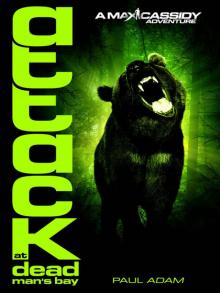 Attack at Dead Man's Bay
Attack at Dead Man's Bay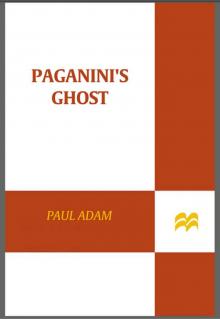 Paganini's Ghost
Paganini's Ghost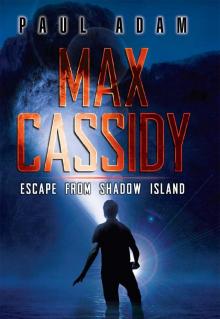 Escape from Shadow Island
Escape from Shadow Island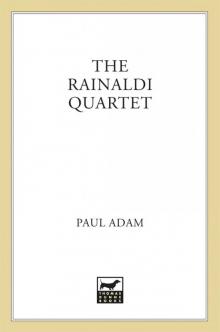 The Rainaldi Quartet
The Rainaldi Quartet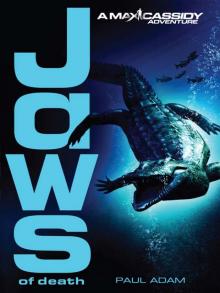 Jaws of Death
Jaws of Death